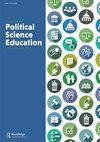高影响力教学实践与大学生政治效能感
IF 0.6
Q3 POLITICAL SCIENCE
引用次数: 1
摘要
摘要该奖学金支持高影响力实践(HIPs)的有效性,以提高本科生的政治知识和参与度。一条调查线询问哪种类型的HIP最有效,尤其是对于来自各种学位项目的学生的核心(必修)课程。2022年,许多学生来自Z世代,出生于1995年至2000年之间。对这一代人的调查发现,他们有不同的学习偏好,缺乏政治效能(或政府反应能力有限)。政府核心课程提供了一种解决HIP学习偏好的方法,并增加了政治知识和效能感。最初,这是一个被新冠肺炎疫情中断的准研究项目,这项探索性研究比较了两种HIPs嵌入式服务学习和市政厅会议模型,以及学生在不同时间和班级类型的政治效能测量。大量工作致力于服务学习,但对市政厅模式的学术调查更为有限。比较两个HIP并应用政治效能测量为未来的研究提供了指导,并有助于就选修政府核心课程的本科生的最有效教学策略进行学术对话。本文章由计算机程序翻译,如有差异,请以英文原文为准。
High-Impact Teaching Practices and Undergraduates’ Political Efficacy
Abstract The scholarship supports the effectiveness of high-impact practices (HIPs) to advance undergraduates’ political knowledge and engagement. A line of inquiry asks which type of HIPs is the most effective, especially for core (required) courses with students from a variety of degree programs. In 2022, many students are from Generation Z, born between 1995 and 2000. Surveys of this generation find distinct learning preferences and a lack of political efficacy (or a limited sense of government responsiveness). Core government courses provide a means to address learning preferences with HIPs, as well as increase political knowledge and a sense of efficacy. Initially, a quasi-research project interrupted by the COVID-19 pandemic, this exploratory study compares two HIPs—embedded service learning and Town Hall Meeting model–and political efficacy measures of students across time and type of class. A significant body of work is devoted to service learning but scholarly investigations of the Town Hall Model are more limited. Comparing two HIPs and applying a political efficacy measure offers a guide for future research and contributes to scholarly conversations regarding the most effective teaching strategies for undergraduate students taking core government courses.
求助全文
通过发布文献求助,成功后即可免费获取论文全文。
去求助
来源期刊

Journal of Political Science Education
POLITICAL SCIENCE-
CiteScore
1.80
自引率
36.40%
发文量
69
期刊介绍:
The Journal of Political Science Education is an intellectually rigorous, path-breaking, agenda-setting journal that publishes the highest quality scholarship on teaching and pedagogical issues in political science. The journal aims to represent the full range of questions, issues and approaches regarding political science education, including teaching-related issues, methods and techniques, learning/teaching activities and devices, educational assessment in political science, graduate education, and curriculum development. In particular, the journal''s Editors welcome studies that reflect the scholarship of teaching and learning, or works that would be informative and/or of practical use to the readers of the Journal of Political Science Education , and address topics in an empirical way, making use of the techniques that political scientists use in their own substantive research.
 求助内容:
求助内容: 应助结果提醒方式:
应助结果提醒方式:


